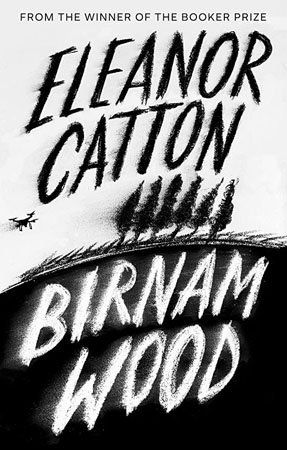Eleanor Catton's prize-winning and best-selling novel “The Luminaries” has a special place in my heart – not only because it's a tremendous story which is brilliantly written – but because it partly inspired me to start this blog in the first place. When I finished reading that intricate and impressive book I felt so compelled to discuss it with other people I went online. It's the first book I posted about here and the conversations which followed encouraged me to continue engaging with the virtual book community. So naturally I'm thrilled that now (nearly 10 years after that novel first came out) she's finally published a new novel “Birnam Wood”. The title is taken from a line in the play 'Macbeth' when the weird sisters predict that “Macbeth shall never vanquish'd be until Great Birnam wood to high Dunsinane hill shall come against him.” It's certainly not necessary to know the implications and meaning of this to appreciate Catton's new novel. The story plays upon themes of ambition and power, but I don’t think the Shakespearian influence is explicit until very late in the book.
At the centre of the book is a New Zealand guerrilla gardening group or farming collective who use the name Birnam Wood. They utilize unused land to cultivate crops to be distributed to those in need. This is both a political act and environmental/humanitarian initiative whose methods aren't often strictly legal. So when the group's founder Mira researches a large tract of land bordering a national forest which has been seemingly abandoned following a natural disaster she sees an opportunity for a large-scale planting project. However, an American billionaire and pioneer in drone technology named Robert Lemoine is under negotiations with the land owners to purchase this tract of land – purportedly to build a doomsday bunker. When Lemoine proposes to the collective that he can charitably fund their activities some members of the group feel that they are making a deal with the devil. What follows is an ecological thriller, in-depth psychological study and social commentary about modern day politics/technology.
Many readers may grapple with getting into this book because Catton front loads the story with a lot of character detail. Long sections describe the primary characters' backgrounds, ideologies, mentalities and conflicts. This means that most of the initial scenes of the novel occur internally as a psycho-drama concerning members of Birnam Wood (especially central members Mira and Shelley), renegade journalist Tony, scheming Lemoine and newly anointed Lord and Lady Darvish who own the property. Reading such a rich portrait of these individuals and their relationship to each other is interesting but there is little action involved until some of the later parts of the novel. It's like spending a long time sitting in a revving car before it launches forward at great speed. But when it does get going the story is absolutely gripping – especially in the final 150 pages. The trouble is that there are 275 pages before getting to that point. I think some readers' patience will have worn thin by then. Again, that's not to say these early sections aren't interesting but they are slow moving. However, I found the thrilling ending and the larger meaning of the book that I was left with extremely compelling. So overall I think it's a worthwhile reading experience and I was glad I went on this journey.
I'm not sure why Catton chose to structure the novel in this way. Typically the information which she relates in great big chunks would be integrated more into scenes where the characters interact and more dramatic action occurs. Yet in this story most of their psychological makeup is related while they scan the internet or their phones or surveillance footage. Characters spend a lot of time justifying their points of view to themselves or projecting into the future how they want events to play out. When verbal exchanges occur such as in a group meeting (hui) or telephone conversation or a dinner party it's more like the characters are delivering monologues without really listening to others. This occurs in a Jane Austen style which makes sense given that Catton recently wrote a screenplay for a new film version of “Emma”.
I think perhaps Catton might be commenting on the way our online lives are so internally focused. When we think we're communicating on the internet we're actually talking more to ourselves or within a narrow group of likeminded people whose opinions are all in agreement. Catton has also commented that when planning the novel each character could be seen as Macbeth as it revolves between their perspectives. This is an intriguing idea to consider in regards to each character's ambition and their relationships to each other and power. However, if these were the things that the author was trying to convey it unfortunately sacrifices the theatrical impetus of a large section of the story. As a result I felt more intellectually involved with this novel rather than emotionally invested. Nevertheless, it's an interesting modern day tale that engages with many environmental and political issues. If Catton weren't an author I had read before I probably wouldn't have finished reading this novel, but this is a book that possesses a subtle power which means that it's worth sticking with till the end.









